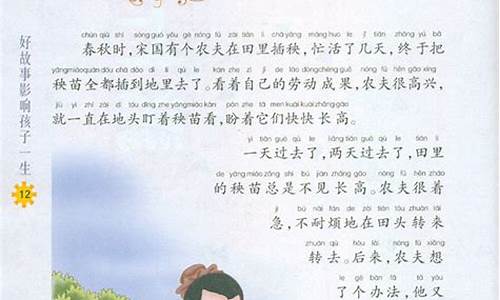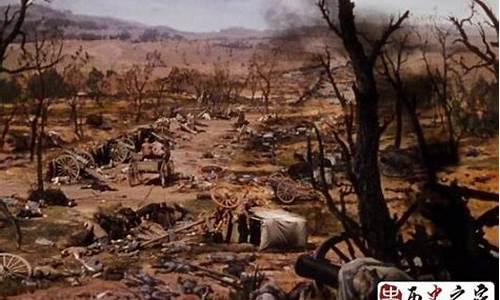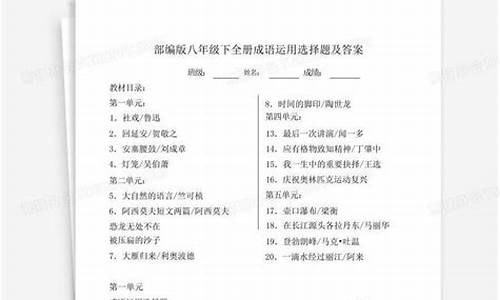您现在的位置是: 首页 > 四字成语 四字成语
英语版成语故事简短
ysladmin 2024-06-18 人已围观
简介英语版成语故事简短 现在,请允许我来为大家详细解释一下英语版成语故事简短的问题,希望我的回答能够帮助到大家。关于英语版成语故事简短的讨论,我们正式开始。1.英语
现在,请允许我来为大家详细解释一下英语版成语故事简短的问题,希望我的回答能够帮助到大家。关于英语版成语故事简短的讨论,我们正式开始。
1.英语写成语故事
2.优秀经典成语故事中英双语?
3.英语成语故事中英对照
4.英文版成语故事有哪些
5.揠苗助长(英文版故事)
6.英语英语成语故事之自相矛盾

英语写成语故事
一言九鼎战国时,秦国的军队团团包围了赵国的都城邯郸,形势十分危急,赵国国君孝成王派平原君到楚国去求援。平原打算带领20名门客前去完成这项使命,已挑了十九名,尚少一个定不下来。这时,毛遂自告奋勇提出要去,平原君半信半疑,勉强带着他一起前往楚国。
平原君到了楚国后,立即与楚王谈及“援赵”之事,谈了半天也毫无结果。这时,毛遂对楚王说:“我们今天来请你派援兵,你一言不发,可你别忘了,楚国虽然兵多地大,却连连吃败仗,连国都也丢掉了,依我看,楚国比赵国更需要联合起来抗秦呀!”毛遂的一席话说得楚王口服心服,立即答应出兵援赵。
平原君回到赵国后感慨地说:“毛先生一至楚,而使楚重于九鼎大吕The warring states, qin army surround the zhao4 guo2's nagara handan, the situation was very urgent, zhao monarch king appointed plain gentleman filial piety to go begging. To chu Plain going to lead 20 to finish the mission, and, MenKe already picked the nineteenth, still less a name shall not come down. At this time, MAO hence proposed to go, plain herassessment salt, reluctantly prince took him went to chu. Plain gentleman to chu immediately after the king talked with the assistance zhao ", talked about the along while also no results. At this time, for the king hair wait, said: "we come here today you send reinforcements, you say, you don't forget, chu although soldiers much bigger, but repeatedly defeats, even countries and lost, in my opinion, chu need more than zhao4 guo2's combined resistance to qin!" Hair wait goes speak oral needs, immediately promised king mullen aassistance zhao. Plain gentleman zhao4 guo2's back after regrets ground say: "hair sir, which enables one to chu chu heavier than the nine tripods big lu."
优秀经典成语故事中英双语?
画龙点睛。字面的意思是画龙之后再点上眼睛。这个成语多用于说话写作那么关于它的历史典故是怎样的呢?一起来看看吧:
Mr. Li is a good painter. One day he draws a beautiful dragon without eyes.
Mr. Zhou looks at the picture and says, “The dragon has no eyes. It isn’t a good picture.”
But Mr. Li smiles and says, “If I add eyes to the dragon, it will fly away.”
Mr. Zhou shakes head and says, “You are boasting. I don’t believe you.”
Mr. Li isn’t angry. He holds the paintbrush and adds eyes to the dragon. Woe! The dragon really flies.
李先生是位很好的画家。一天画了一条栩栩如生的龙,但是这只龙没有眼睛。
周先生见了说:“这条龙没有眼睛。这不算一张好画。”
可是李先生笑着说:“如果我给它加上眼睛,它就会飞走了。”
周先生摇头说:“你吹牛。我不相信。”
李先生也不生气,只是拿起笔给龙点上眼睛。哇!龙真的飞走了。
英语成语故事中英对照
如果觉得学英语觉得枯燥的话,可以加点乐趣的元素进去。我在此献上英语故事,希望对你有所帮助。
成语寓言故事:Playing the Lute to a Cow对牛弹琴
Gong Mingyi was a famous musician in ancient times, who played the lute very well.
公明仪是古代一位很有名的音乐家,弹得一手好琴。
One day, while playing the lute indoors, Gong Mingyi saw a cow eating grass leisurely outside the window. He had a sudden whim to play some melodies for the cow. He first played the "Exercise of Qing Jiao", but the cow still kept on eating grass with head lowered. He seemed to realize that the melody was too highbrow for the cow to understand.
有一天,他在室内弹琴,看见一头牛在窗外悠闲地吃著草。他忽然想弹几曲给牛听听。他先弹了一曲“清角之操”。可是,牛还是跟刚才一样,只顾低着头吃草。他似乎意识到,这支曲子太高雅了,牛没有听懂。
So he played several other melodies, imitating the buzzing sounds of swarms of flying mosquitoes, and the bleats of a calf looking for its panions. At this, to his surprise, the cow stopped eating grass, but raised its head, pricked up its ears, wagged its tail and, pacing up and down in *** all steps, began to listen attentively.
于是,他弹了另外几支曲子,模拟蚊子成群结队飞来飞去的嗡嗡声;模拟小牛犊寻找伙伴的眸眸叫唤声。这样一来,这头牛竟然不吃草了,抬起头,竖着耳朵,甩著尾巴,迈著小步,留心地倾听起来。
成语寓言故事:The Gentleman on the Beam梁上君子
One year in the Eastern Han Dynasty, there was a serious famine in I-Jenan.
东汉时的某一年,河南一带,饥荒严重。
One night, a thief sneaked into Chen Shi's house and hid himself on the beam. When Chen Shi was aware of this, he got out of bed without haste, called his children and grandchildren to his room and said in a stern voice:
一天夜里,一个小偷潜人陈宴家,躲藏在屋子的横梁上。陈宴觉察到后,不慌不忙地起了床,把儿女子孙们都叫到屋里,严厉地说:
"One must always restrain and encourage oneself no matter under what circumstances. Bad men were not born bad. It is only bee they don't restrain themselves that they develop bad habits and turn bad gradually. That gentleman on the beam is just a case in point."
“一个人无论在什么情况下,都要克制自己,勉励自己。坏人,不是天生就坏,而是因为平时不克制自己而养成了坏的习惯,才慢慢地变坏的。那位梁上君子就是这样。”
Much ashamed upon hearing this, the thief hiding on the beam promptly jumped down to the ground, kowtowed and begged for forgiveness.
躲在梁上的小偷听了,很惭愧,连忙翻身落地,磕头求饶。
Chen Shi enlightened him by saying:
陈宴开导他说:
"Judging from your appearance, you don't look like a bad man. Perhaps you are driven by poverty to steal. But you should carefully examine yourself and turn over a new leaf."
“看你的样子并不像坏人,你这样做,恐怕也是被贫困逼出来的。不过你应当好好反省,改邪归正。”
Then he immediately asked someone to bring two bolts of white silk to give the thief as a present. The thief kowtowed and thanked him repeatedly.
接着,他马上叫人拿来两匹白绢赠送给小偷。小偷不停地磕头致谢。
Since then, very few thefts occurred in this locality.
从此以后,这个地方很少发生偷盗的事情。
成语寓言故事:Cutting the Fabric to Admonish the Hu *** and断织诫夫
A long time ago, in Henan there was a young man named Le whose family was very poor.
从前,河南有个青年,名叫乐羊子,家里很穷。
One day, Le Yangzi picked up a piece of gold on the road. He happily took it home and gave it to his wife. His wife said in all seriousness:
有一天,乐羊子在路上拾到一块金子,高高兴兴地拿回家,交给妻子。妻子却一本正经地说:
"I heard that men with aspiration do not drink from the Dao ***meaning steal in Chinese*** Spring, and honest men do not take handout food. Furthermore, picked-up money and things will stain one's moral character."
“我听说,有志气的人不喝盗泉之水,廉洁的人不吃磋来之食;何况,这拾来的钱物,会玷污一个人的品德!”
Hearing this, Yangzi was very ashamed of himself. So he threw the piece of gold away in the open field.
乐羊子听了妻子的话,心里感到非常惭愧,就把金子扔到野外去了。
This incident touched Le Yangzi deeply. He made up his mind to leave home and go to a faraway place to study under a master.
这件事,对乐羊子的触动很大。他下了决心,离家去很远的地方,拜老师学习。
One year later, Le Yangzi returned home. His wife inquired why he returned so soon. Le Yangzi *** iled and said:
一年以后,乐羊子回到家里。妻子询问丈夫为什么这么快就回来了。乐羊子笑着说:
"There is no other reason except that I, being all alone away from home, miss you so much that I e back."
“没有别的原因,只是一个人在外面太想念你了,所以就回来了。”
His wife turned pale at his words. She took up a knife, ran to the silk loom, put the knife on the silk fabric woven from natural silk, and said to Le Yangzi in an agitated tone:
妻子一听,脸色变得刷白。她顺手拿起一把刀,奔到丝织机前,把刀放在蚕丝织成的绸面上,激动地对乐羊子说:
"I reeled silk strand by strand from cocoons and, with the shuttle moving to and fro, weaved it inch by inch into this bolt of silk fabric. Now if I should cut the fabric with the knife, all the previous efforts and time I've devoted would be wasted. While studying, you should always remind yourself that there is yet much more to learn. Only in this way can you cultivate a noble moral character. If you give up halfway, it will be just like cutting up this silk fabric at one stroke."
“这丝绸,是我从蚕茧缴成丝线,一丝一缕,一梭子来,一梭子去,一寸一寸地织,才织成这一匹的啊!现在,我假使一刀割断这匹丝绸,岂不前功尽弃,白白地浪费了时间吗?你呀,读书求知识,也应该随时提醒自己学得还很不够,这样才能养成高尚的品德。如果你半途而废,那么跟一刀割断这匹丝绸又有什么两样呢!”
Deeply moved by his wife's words, Le Yangzi bid farewell to her at once, went to the faraway place, and made determined efforts to study hard. He had been away from home for a good seven years, and finally succeeded in his studies.
听了妻子的这番话,乐羊子深深地感动了。他马上告别了妻子,去远方发愤攻读,整整七年没有回家,最后终于学成功了。
英文版成语故事有哪些
如果觉得学英语觉得枯燥的话,可以加点乐趣的元素进去。我在此献上 英语 故事 ,希望对你有所帮助。成语 寓言故事 :Losing One's Head忘乎所以
The gorillas in the valleys in the south often lived together in groups of several tens. They were fond of drinking wine, and even fonder of imitating man's behavior.
南方山谷里的猩猩,常常数十成群地生活在一起。它们喜欢喝酒,更喜欢模仿人的行为。
People knew very well their habits and often put wine or distiller's grains on the roadside together with many straw sandals connected together with ropes.
人们掌握了它们的习性,经常把酒或酒糟放在路边,旁边又放着许多草鞋,草鞋用绳索连接起来。
The gorillas knew this was a trick to lure them into traps and cursed:
猩猩知道这是人们引诱它们上当,便破口大骂:
"Humph! Do you think we don't know your tricks? We'll never be taken in!"
?哼!你们以为我们不知道吗?我们决不上你们的当!?
So they called one another, turned round and left.
于是,互相招呼,回头就走。
But they had already smelled the aroma of the wine, and couldn't bear to part with it. Even after they left, they would turn their heads to look back. When they saw no one there, they would turn back; and after they turned back, they were afraid of being deceived, and left again. After much hesitation, they finally said to themselves:
但是,它们已经闻到了酒香,总有点恋恋不舍,就是走了,也要回过头来望望。回头望不见人,便又转过来;转过来了又怕上当,再返身回去。犹豫了好久,它们最后自言自语地说:
"Just for a taste of the wine. It won't matter as long as we don't get drunk."
?去尝尝味道,不喝醉就不碍事。?
Shortly afterwards, they agreed to come back to drink the wine. When they got drunk, they forgot everything. Every gorilla put on the straw sandals and imitated the way man walks.
不一会儿,大家同意了,都回来喝酒。等到喝醉的时候,它们一切都忘记了,一个个穿上草鞋,学着人走路。
As a result, they fell down one after another and were all caught alive by people.
结果,一个个都跌倒了,统统被人活捉。
成语寓言故事:A Half Day's Leisure半日清闲
One day, a high official wanted to amuse himself in a temple.
一天,有一个大官,要到寺院里去游玩。
His subordinates notified the monks in the temple three days in advance to prepare a good meal on time. So all the monks in the temple busied themselves with the preparation.
他的手下人便在三天前就通知寺院里的和尚,准时备好饭菜。于是,寺院里所有的和尚,都忙着张罗了起来。
The temple was situated in a remote mountain, surrounded by bamboo groves, and very tranquil. After the high official had strolled about for a while, he was very pleased. While dining, he recited lines from a poem of the Tang Dynasty:
寺院坐落在深山里,四面都是竹林,的确非常清静。大官游玩了一番之后,非常高兴,一面吃饭,一面吟起了唐人的诗句:
"Passing through the bamboo courtyard and meeting a monk,A half day's leisure is gained in this fleeting life."
?因过竹院逢僧话,又得浮生半日闲。?
When the old monk heard these lines of the poem, he couldn't help laughing.
老和尚听了诗句,不觉笑了起来。
The high official asked hastily:
大官连忙问道:
"What are you laughing about?"
?你笑什么?
The old monk replied:
老和尚回答道:
"Your Honour have indeed gained a half day's leisure, but I have been busy for three whole days."
?您老人家固然清闲了半天,可是我老和尚却已经忙了整整三天!?
成语寓言故事:The Kingfisher Moves Its Nest翠鸟迁巢
In order to avoid calamities, at first the kingfisher always selects a high place to build its nest.
翠鸟起先为了避免灾祸,总是选择高的地方筑巢。
But when the young birds are hatched, it will move to a place a little lower to build its nest. This is because the kingfisher is particularly fond of its offspring and is afraid they而ght fall down from a high place.
但是,等到孵出小鸟以后,它就到少许低一点儿的地方筑巢。这是因为它特别爱护小鸟,生怕它们从高处摔下来。
When the young birds grow beautiful feathers, the kingfisher will become even fonder of them and more protective, so it will move its nest further downward, with the result that the young birds are easily taken away by people.
等到小鸟长出了美丽的羽毛以后,母鸟就更加喜欢和爱护它们了,于是又向下搬巢,结果小翠鸟却被人们轻而易举地掏走了。
揠苗助长(英文版故事)
英文版成语故事:
凿壁偷光
Kuang Heng was born in a poor family. He liked reading books very much. He needed to work at daytime, so he had to read books during night. But he was too poor to buy a candle.
One day, he found his neighbour had candles, but the light couldn’t go through his room. So he dug a small hole on the wall so that he could use the light to read books. From that day, he read books every night until the light went out.
However, he finished reading all his books and there were no books for him to read. Then he went to a rich man’s house and worked for him without payment. The rich man asked: “ Why don’t you want the money?” Kuang Heng said: “ Because I only want to borrow your books.” The rich man agreed. Kuang Heng read the books one by one.
Finally, he became a great scholar.
匡衡勤奋好学,但家中没有蜡烛。邻家有蜡烛,但光亮照不到他家,匡衡就在墙壁上凿了洞引来邻家的光亮,让光亮照在书上读书。
县里有个大户人家不怎么识字,但家中富有,有很多书。匡衡就到他家去做雇工,但不要报酬。
主人感到很奇怪,问他为什么这样,他说:“我希望读遍主人家的书。”主人听了,深为感叹,就借给匡衡书。于是匡衡成了一位伟大的学者。
英语英语成语故事之自相矛盾
揠苗助长(英文版故事)
揠苗助长(To Pull up the Seedlings to Help Them Grow)
Once upon a time, an old farmer planted a plot of rice. Everyday he went to the field to watch the seedlings grow. He saw the young shoots break through the soil and grow taller each day. But still, he thought they were growing too slowly. He got impatient with the young plants. "How could the plants grow faster?" He tossed in bed during the night and could not sleep. Suddenly he hit upon an idea. He had an idea not wait for daybreak. He jumped out of the bed and dashed to the field. By the moonlight, he began working on the rice seedlings. One by one, he pulled up the young plants by half an inch. When he finished pulling, it was already morning. Straightening his back, he said to himself, "What a wonderful idea! Look, how much taller the plants have grown one night!" With great satisfaction, he went back home. He told his son what he had done in a triumphant tone. His son was shocked. Now the sun had risen. The young man was heart-broken to see all the pulled-up young plants dying.
People now use " Ba Miao Zhu Zhang" to describe the behavior of those who are too eager to get something done only to make it worse. The idiom is a bit like the English proverb "Haste makes waste" ------to spoil things by excessive enthusia *** .
异译
古时候宋国有个农夫,种了稻苗后,便希望能早早收成。
每天他到稻田时,发觉那些稻苗长得非常慢。他等得不耐烦,心想:"怎么样才能使稻苗长得高,长很快呢?想了又想,他终了想到一个"最佳方法",就是将稻苗拨高几分。
经过一番辛劳后,他满意地扛锄头回家休息。然后回去对家里的人表白:"今天可把我累坏了,我帮助庄稼苗长高一大截!"
他儿子赶快跑到地里去一看,禾苗全都枯死了。
人们现在用拔苗助长形容急于求成,违法客观规律,只会把事情办坏。成语有点像西方的谚语“欲速则不达”——过度的热情只会把事情办坏
“揠苗助长”的故事形成于A
成语故事·揠苗助长
[zww./CGZ]
来源:湖北少年儿童出版社 2004-12-7 10:15:45
--------------------------------------------------------------------------------
揠(yà)这个成语出自《孟子·公孙丑上》。
春秋时期,宋国有一个农夫,他总是嫌田里的庄稼长得太慢,今天去瞧瞧,明天去看看,觉得禾苗好像总没有长高。他心想:有什么办法能使它们长得高些快些呢?
有一天,他来到田里,把禾苗一棵一棵地往上拔。一大片禾苗,一棵一棵地拔真费了不少的力气,等他拔完了禾苗,已经累得筋疲力尽了,可是他心里却很高兴。回到家里还夸口说:“今天可把我累坏了,我帮助禾苗长高了好几寸!”他儿子听了,赶忙跑到田里去看,发现田里的禾苗全都已经枯死了。
“揠苗助长”用来比喻不管事物的发展规律,急于求成,反而把事情弄糟。“揠苗助长”也可写作“拔苗助长”。
《孟子·公孙丑上》:“宋人有闵其苗之不长而揠之者,茫茫然归,谓其人曰:‘今日病矣,予助苗长矣。’其子趋而往视之,苗则槁矣。”所以选a战国
揠苗助长
成语-揠苗助长
发 音yà miáo zhù zhǎng
释 义揠:拔起。把苗拔起,以助其生长。后用来比喻违反事物的发展规律,急于求成,反而坏事。
出 处先秦·孟轲《孟子·公孙丑上》:“宋人有闵其苗之不长而揠之者,芒芒然归,谓其人曰:'今日病矣,予助苗长矣。'其子趋而往视之,苗则槁矣。”
近义词 拔苗助长、欲速不达
用 法 连动式;作主语、宾语;含贬义
示 例 对学生的教育既不能~,也不能放任自流。
典 故
古时候宋国有个农夫,种了稻苗后,便希望能早早收成。
每天他到稻田时,发觉那些稻苗长得非常慢。他等得不耐烦,心想:"怎么样才能使稻苗长得高,长很快呢?想了又想,他终了想到一个"最佳方法",就是将稻苗拨高几分。
经过一番辛劳后,他满意地扛锄头回家休息。然后回去对家里的人表白:"今天可把我累坏了,我帮助庄稼苗长高一大截!
他儿子赶快跑到地里去一看,禾苗全都枯死了。
寓意客观事物的发展自有它的规律,纯靠良好的愿望和热情够的,很可能效果还会与主观愿望相反。这一寓言还告知一具体道理:"欲速则不达"。
原文:
宋人有闵其苗之不长而揠之者,芒芒然归,谓其人曰:“今日病矣!予助苗长矣!”其子趋而往视之,苗则槁矣。天下之不助苗长者寡矣。以为无益而舍之者,不耘苗者也;助之长者,揠苗者也,非徒无益,而又害之。(闵 通:悯)
B
任何事物都必须遵循客观规律,否则必将受到惩罚。
有些家长望子成龙,在周末送孩子上各种各样的补习班,使孩子疲惫不堪。
寓言故事:自相矛盾,滥竽充数,画龙点睛,守株待兔,买椟还珠,刻舟求剑,郑人买履,黔驴技穷,亡羊补牢
揠苗助长 作文揠苗助长
1. 成语-揠苗助长
发 音yà miáo zhù zhǎng
释 义揠:拔起。把苗拔起,以助其生长。
后用来比喻违反事物的发展规律,急于求成,反而坏事。
出 处先秦·孟轲《孟子·公孙丑上》
内容宋人有闵其苗之不长而揠之者,芒芒然归,谓其人曰:“今日病矣,予助苗长矣!”其子趋而往视之,苗则槁矣。
天下之不助苗长者寡矣!以为无益而舍之者,不耘苗者也;助之长者,揠苗者也;非徒无益,而又害之。
(译文)古时候宋国有个人,嫌禾苗长得太慢,就一棵棵的往上拔起一点,回家还夸口说:“今天我帮助苗长了!”他儿子听说后,到地里一看,苗都死了。天下不助苗生长的人实在很少啊。以为没有用处而放弃的人,就像是不给禾苗锄草的懒汉。妄自帮助它生长的,就像拔苗助长的人,非但没有好处,反而危害了它。
揠苗助长原文本文言文选自《孟子·公孙丑上》 发音yà miáo zhù zhǎng释义揠:拔起。把苗拔起,帮助其生长,后用来比喻违反事物的发展规律,急于求成,反而坏事。 寓意 1、客观事物的发展自有它的规律,纯靠良好的愿望和热情是不够的,很可能效果还会与主观愿望相反。这一寓言还告知一具体道理:"欲速则不达"。 2、人们对于一切事物都必须按照客观规律去发挥自己的主观能动性,才能把事情做好。反之,单凭自己的主观愿望去做,即使有善良的愿望,美好的动机,结果也只能是适得其反。 出处先秦·孟轲《孟子·公孙丑上》 宋人有闵①其苗之不长②而揠③之者,芒芒然归④,谓其人⑤曰:“今日病⑥矣,予⑦助苗长矣!”其子趋⑧而⑨往视之,苗则槁⑩矣。 天下之不助苗长者寡矣!以为无益而舍之者,不耘苗⑾者也;助之长者,揠苗者也;非徒⑿无(13)益,而又害之。(选自《孟子·公孙丑上》) [注释] ⑴闵(mǐn)——同“悯”,担心,忧虑。 ⑵长(zhǎng)——生长,成长。 ⑶揠(yà)——拔。 ⑷芒芒然——疲倦的样子。 ⑸其人——他家里的人。 ⑹病——精疲力尽,是引申义 ⑺予——我,第一人称代词. ⑻趋——快走。 ⑼往——去,到..去。 ⑽槁(gǎo)——草木干枯。 ⑾耘苗:给苗锄草 ⑿非徒——非但。徒,只是。 ⒀益:好处。 ⒁子:儿子 译文古宋国有个人担忧他的禾苗不长就一棵一棵的拔禾苗一天下来十分疲劳,回到家对他的家人说:“今天可把我累坏了,我总算让禾苗一下子就长高了!”他儿子听说后急忙到地里去看苗,然而苗都枯萎了。 天下不犯这种拔苗助长错误的人实在很少啊!以为没有用处而放弃的人,就像是不给禾苗锄草的懒汉。妄自帮助它生长的,就像拔苗助长的人,非但没有好处,反而害了它。先秦·孟轲《孟子·公孙丑上》
宋人有闵①其苗之不长②而揠③之者,芒芒然归④,谓其人⑤曰:“今日病⑥矣,予⑦助苗长矣!”其子趋⑧而⑨往视之,苗则槁⑩矣。
天下之不助苗长者寡矣!以为无益而舍之者,不耘苗⑾者也;助之长者,揠苗者也;非徒⑿无(13)益,而又害之。(选自《孟子·公孙丑上》)
[注释] ⑴闵(mǐn)——同“悯”,担心,忧虑。
⑵长(zhǎng)——生长,成长。
⑶揠(yà)——拔。
⑷芒芒然——疲倦的样子。
⑸其人——他家里的人。
⑹病——精疲力尽,是引申义
⑺予——我,第一人称代词.
⑻趋——快走。
⑼往——去,到..去。
⑽槁(gǎo)——草木干枯。
⑾耘苗:给苗锄草
⑿非徒——非但。徒,只是。
⒀益:好处。 ⒁子:儿子
译文
古宋国有个人担忧他的禾苗不长就一棵一棵的拔禾苗一天下来十分疲劳,回到家对他的家人说:“今天可把我累坏了,我总算让禾苗一下子就长高了!”他儿子听说后急忙到地里去看苗,然而苗都枯萎了。 天下不犯这种拔苗助长错误的人实在很少啊!以为没有用处而放弃的人,就像是不给禾苗锄草的懒汉。妄自帮助它生长的,就像拔苗助长的人,非但没有好处,反而害了它。
英语版中国成语故事带翻译,短一点
自相矛盾
A man of the state of Chu (chǔ guó 楚国) had a spear and a shield for sale.
楚国有个卖兵器的人,在市场上卖矛和盾。
He was loud in praises of his shield."My shield is so strong that nothing can pierce it through."
为了让人家愿意买他的货,他先举起盾向人们夸口道:“你们看,我的盾是世上最坚固的盾,任何锋利的东西都不能刺穿它。”
He also sang praises of his spear."My spear is so strong that it can pierce through anything."
接着又举起他的矛,向人吹嘘说:“你们再看看我的矛,它锋利无比,无坚不摧,无论多么坚硬的盾,都挡不住它,一刺就穿!”
"What would happen," he was asked, "if your spear is used to pierce your shield?"
人群中有人问道:“如果用你的矛去刺你的盾,结果怎么样?”
It is impossible for an impenetrable shield to coexist with a spear that finds nothing impenetrable.
这世界上一样无坚不摧的东西永远不会与一样什么都能摧毁的东西共存。
塞翁失马Blessing or Bane
战国时期,靠近北部边城,住着一个老人,名叫塞翁。塞翁养了许多马,一天,他的马群中忽然有一匹走失了。邻居们听说这件事,跑来安慰,劝他不必太着急,年龄大了,多注意身体。塞翁见有人劝慰,笑了笑说:“丢了一匹马损失不大,没准会带来什么福气呢。”
邻居听了塞翁的话,心里觉得很好笑。马丢了,明明是件坏事,他却认为也许是好事,显然是自我安慰而已。过了几天,丢失的马不仅自动返回家,还带回一匹匈奴的骏马。 邻居听说了,对塞翁的预见非常佩服,向塞翁道贺说:“还是您有远见,马不仅没有丢,还带回一匹好马,真是福气呀。” 塞翁听了邻人的祝贺,反而一点高兴的样子都没有,忧虑地说:“白白得了一匹好马,不一定是什么福气,也许惹出什么麻烦来。” 邻居们以为他故作姿态纯属老年人的狡猾。心里明明高兴,有意不说出来。 塞翁有个独生子,非常喜欢骑马。他发现带回来的那匹马顾盼生姿,身长蹄大,嘶鸣嘹亮,膘悍神骏,一看就知道是匹好马。他每天都骑马出游,心中洋洋得意。 一天,他高兴得有些过火,打马飞奔,一个趔趄,从马背上跌下来,摔断了腿。邻居听说,纷纷来慰问。 塞翁说:“没什么,腿摔断了却保住性命,或许是福气呢。”邻居们觉得他又在胡言乱语。他们想不出,摔断腿会带来什么福气。 不久,匈奴兵大举入侵,青年人被应征入伍,塞翁的儿子因为摔断了腿,不能去当兵。入伍的青年都战死了,唯有塞翁的儿子保全了性命。Near China's northern borders lived a man well versed in the practices of Taoism. His horse, for no reason at all, got into the territory of the northern tribes. Everyone commiserated with him.
"Perhaps this will soon turn out to be a blessing," said his father.
After a few months, his animal came back, leading a fine horse from the north. Everyone congratulated him.
"Perhaps this will soon turn out to be a cause of misfortune," said his father.
Since he was well-off and kept good horses his son became fond of riding and eventually broke his thigh bone falling from a horse. Everyone commiserated with him.
"Perhaps this will soon turn out to be a blessing," said his father.
One year later, the northern tribes started a big invasion of the border regions. All able-bodied young men took up arms and fought against the invaders, and as a result, around the border nine out of ten men died. This man's son did not join in the fighting because he was crippled and so both the boy and his father survived.
今天的讨论已经涵盖了“英语版成语故事简短”的各个方面。我希望您能够从中获得所需的信息,并利用这些知识在将来的学习和生活中取得更好的成果。如果您有任何问题或需要进一步的讨论,请随时告诉我。








